新概念第二册 第一课
新概念英语第二册第1课Aprivateconversation

新概念英语第二册第1课Aprivateconversation主语一般为名词、代词或名词短语,通常位于动词之前。
动词必须与主语“一致”,所以主语决定动词的单复数形式(如Iam,youare,heha)。
宾语一般为名词、代词或名词短语。
在主动句中,宾语一般位于动词之后。
一个句子不总需要有宾语。
状语的位置比较灵活。
当一个句子里有一种以上的副词时,地点副词的一般位置是在方式副词之后、时间副词之前,如上面的最后一个例句。
时间状语可以在句尾,也可以在句首:LatnightLucywenttothetheatre. 昨晚露西去剧院看戏了。
Iheardavoiceatthedoorjutnow. 我刚才听到门口有声音。
Samlitenedtothetoryquietly. 萨姆静静地听着故事。
Themanranawayquickly. 那人很快跑掉了。
(无宾语)词汇学习Wordtudy 1.enjoyvt. 基本意义为“欣赏”、“享受”、“喜爱”,后面一般跟名词、代词(包括反身代词)或动名词形式。
(1)Didyouenjoythemovielatnight你喜欢昨晚的电影吗Ienjoyeditverymuch.我很喜欢。
(2)Janedoen'tenjoywimming.Sheenjoygoingtothetheatre. 简不喜欢游泳。
她喜欢去剧院看戏。
(3)Enjoyyourelf! 好好玩吧!Wealwayenjoyourelve. 我们总是玩得很开心。
2.pay (1)vt.,vi.支付(价款等):Haveyoupaidtheta某i-driver 你给出租车司机钱了吗?Youcanpayadepoitofthirtypound…您可以先付30英镑的定金……Ipaid50dollarforthikirt. 我花50美元买了这条裙子。
I'llpaybyintalment. 我将分期付款。
新概念英语第二册第一课课文及翻译

新概念英语第二册第一课课文及翻译
【Text】Last week I went to the theatre. I had a very good seat. The play was very interesting. I did not enjoy it. A young man and a young woman were sitting behind me. They were talking loudly. I got very angry.
I could not hear the actors. I turned round. I looked at the man and the woman angrily. They did not pay any attention. In the end, I could not bear it. I turned round again. "I can't hear a word!" I said angrily. "It's none of your business," the young man said rudely. "This is a private conversation!"
参考译文:上星期我去看戏. 我的座位很好, 戏很有意思, 但我却无法欣赏. 一青年男子与一青年女子坐在我的身后, 大声地说着话. 我非常生气, 因为我听不见演员在说什么. 我回过头去怒视着那一男一女, 他们却毫不理会. 最后, 我忍不住了, 又一次回过头去, 生气地说: “我一个字也听不见了!”“不关你的事, “那男的毫不客气地说, “这是私人间的谈话!”。
新概念英语第二册第一课

不注意 有点注意 亲密注意 更多注意
10. bear v. 容忍
eg. I can't bear it. 我受不了了。 stand=put up with=bear 都可以表示容忍
bear n. 熊 a big black bear 一头大黑熊
11. business n. 事
12. rudely adv. 粗鲁地
疑问式: Did John write a letter to his father yesterday?
答复: Yes, he did./ No, he didn't.
Last week I went to the theatre. I had a very good seat. The play was very interesting. I did not enjoy it. A young man and a young woman were sitting behind me. They were talking loudly. I got very angry. I could not hear the actors. I turned round. I looked at the man and the woman angrily. They did not pay any attention. In the end, I could not bear it. I turned round again. 'I can't hear a word!' I said angrily. 'It's none of your business,' the young man said rudely. 'This is a private conversation!'.
新概念英语(第二册第1课讲解)
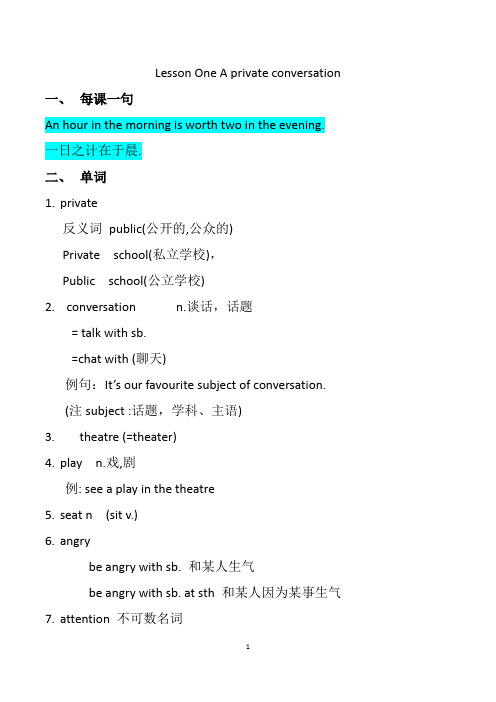
Lesson One A private conversation 一、每课一句An hour in the morning is worth two in the evening.一日之计在于晨.二、单词1.private反义词public(公开的,公众的)Private school(私立学校),Public school(公立学校)2.conversation n.谈话,话题= talk with sb.=chat with (聊天)例句:It’s our favourite subject of conversation.(注subject :话题,学科、主语)3.theatre (=theater)4.play n.戏,剧例: see a play in the theatre5.seat n (sit v.)6.angrybe angry with sb. 和某人生气be angry with sb. at sth 和某人因为某事生气7.attention 不可数名词pay attention to n./doing 注意做某事pay no attention to n./doing 一点都没注意pay much attention to n./doing 多加留心,多注意8.bear n.熊v.容忍(bore ,borne)类似单词:beer(啤酒),dear(亲爱的)同义词:stand(容忍),(stood,stood)stand doing sth 容忍做某事例句: I can’t stand it. 我一点不喜欢.9.business(ness名词后缀) 事;商业;生意business man商人; business woman 女商人10.k ey n.钥匙the key to the door键盘keyboard答案the key to the question = the answer to the question 关键的,重点的key school 重点学校11.r ude adj.无礼的反义词:polite; 近义词: impolite(p 开头的词,否定前缀im) Be rude to sb. 对…无礼Be friendly to sb. 对…友好Be polite to sb. 对…有礼貌注:否定前缀就当没看见,含有否定前缀的不是否定词。
新概念英语第二册第一课
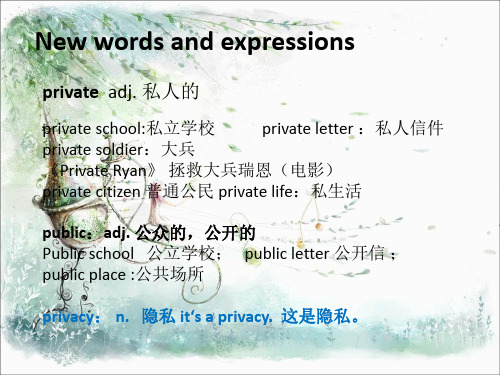
go to + 人’s 表示去这个人开的店或者某人家
go to the doctor’s 去看医生 go to the butcher’s 去买肉 go to the Sally’s 去Sally家
enjoy + sth. 喜欢;从中得到一种享受
eg. I enjoy the class/music/book/movie. enjoy yourself/ have fun: 玩的开心
attract/ draw attention 吸引注意 eg.
Films with stars always attract great attention .
As the youngest child, she was always the center of attention.
bear : (bore , borne) v. 容忍
Let’s get down to our business. 让我们言归正传。
Note on the text
go to the theatre 去戏院
go to + place(地点) 表示去某地干什么
go to the hospital 去医院看病
go to school
去上学
go to the cinema 去看电影
turn round = turn around 转身
turn sb. away : 拒绝,(戏院,电影院等)不让进。
turn back 掉头,折回 turn back the clock 重归于好,倒退 turn on/ off 打开/关掉 turn into 变成 turn sb./sth. into sb. In a flash light, the prince turned into a frog.
逐句精讲新概念英语第二册第一课 私人谈话
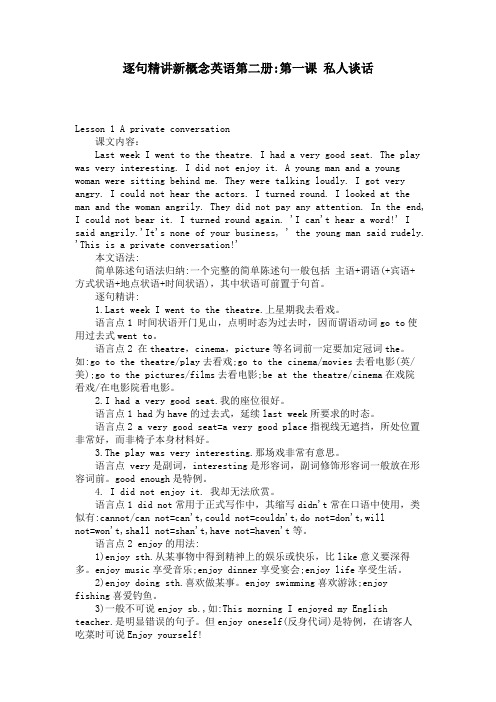
逐句精讲新概念英语第二册:第一课私人谈话Lesson 1 A private conversation课文内容:Last week I went to the theatre. I had a very good seat. The play was very interesting. I did not enjoy it. A young man and a young woman were sitting behind me. They were talking loudly. I got very angry. I could not hear the actors. I turned round. I looked at the man and the woman angrily. They did not pay any attention. In the end, I could not bear it. I turned round again. 'I can't hear a word!' I said angrily.'It's none of your business, ' the young man said rudely. 'This is a private conversation!'本文语法:简单陈述句语法归纳:一个完整的简单陈述句一般包括主语+谓语(+宾语+方式状语+地点状语+时间状语),其中状语可前置于句首。
逐句精讲:st week I went to the theatre.上星期我去看戏。
语言点1 时间状语开门见山,点明时态为过去时,因而谓语动词go to使用过去式went to。
语言点2 在theatre,cinema,picture等名词前一定要加定冠词the。
如:go to the theatre/play去看戏;go to the cinema/movies去看电影(英/美);go to the pictures/films去看电影;be at the theatre/cinema在戏院看戏/在电影院看电影。
新概念二第一课
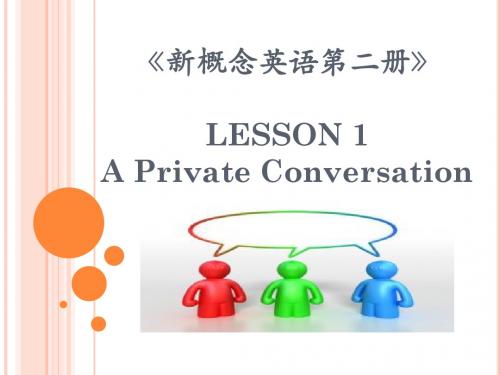
were sitting 过去进行时 构成: was / were + doing eg. What were you doing at 7 o’clock last night?
I was having dinner at 7 o’clock last night.
get angry: 生气(强调变化过程)
Business
n. 事(私人的事或份内的事)
Eg:It’s none of your business. 不管你的事!
n. 生意 do business 做生意 on business 出差
Rudely adv. 无礼地,粗鲁地 rude adj. 粗鲁的,无礼的
Lesson 1
go to the theatre: 去看戏
① go to the +地点:去某地干嘛
Eg:go to the hospital (不是去看病,可以是去看病人)
②go to the +人’ s: 去某人开的店
Eg:go to the doctor’s (去看病) go to the butcher’s (去买肉)
③ go to +名词 (名词前不加冠词)
Eg: go to school 去上学 go to hospital 去医院看病
2. enjoy +sth. 喜欢,从中得到享受;
enjoy the music/ the dinner enjoy doing sth. enjoy oneself :过的开心,愉快
《新概念英语第二册》 LESSON 1 A Private Conversation
(完整)新概念英语第二册第一课(包含课文、练习及)

go to the cinema =see a film 去电影院看电影
go to the dairy 去牛奶店
go to the + 人 + 's 表示去这个人开的店
Seat n。 座位
这个座位有人么?Is anyone here? /Is this seat taken, please?
vt。 使就坐
结构:seat oneself 常用be seated形式.
We were seated at the table。
All of us were seated around the table and Aunt Pat served spaghetti for supper.
‘It's none of your business,' the young man said rudely. ‘This is a
private conversation!'
New words and expressions 生词和短语
private adj. 私人的
conversation n。 谈话
enjoy +代词,一般为反身代词
enjoy oneself =have a good time 玩的很开心,过的很愉快
e.g。 I enjoyed myself last night。/I had a good time last night。
③ enjoy +动名词
Jane doesn't enjoy swimming。 She enjoys going to the theatre.
新概念第二册第一课
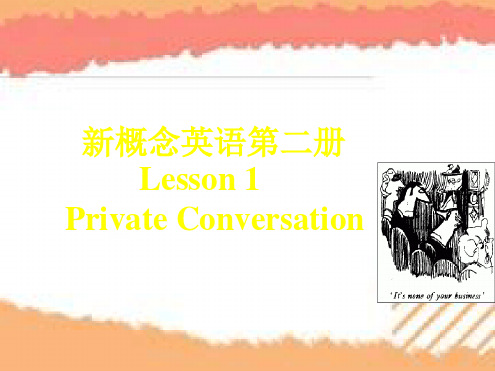
see:看见,强调结果; look:看,动作; watch:长时间关注,尤其是活动的物体
I had dinner and watched TV for several hours. He spent the entire afternoon watching a
football match .
They did not pay any attention (to me). In the end(=at last), I could not bear it(指代前面情形).
Today we will learn a story taking place in a theatre . 今天要学习一个发生在剧院里的故事
Let's listen to the audio first and try to understand the main idea of the story .
? Ask them to change their seats.
? Complain to the clerk of the theatre and drive them away.
? Hit them and make them keep silence.
? Return your ticket and go to the theatre next week.
have a talk.
2、conversation 一般用于正式文体中, 内容上往往不
正式: They are having a conversation.
3、dialogue 对话, 可以指正式国家与国家会谈 :
China and Korea are having a dialogue.
新概念英语第二册第一课 详细版
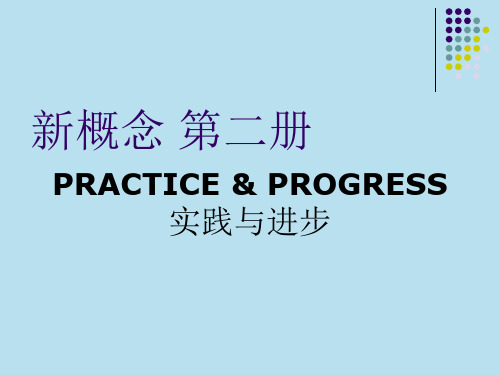
bear hug热情的拥抱
11. business ① n. 生意
business man 生意人
do business 做生意
go to some places on business因公出差
②n.某人自己的私人事情
6. He had a good seat. He was sitting in a good( ).
A. chair b. place c. armchair d. class 7. He was a young man. He wasn’t very ( ) A. old b. big c. tall. d. large 8. The writer looked at the man and the woman
looked at ( )angrily. A. them b. they c. their d. us 5. The young man and the young woman paid ( )
attention to the writer. A. none b. any c. not any d. no
the children, quietly 5.quietly, the door, he, opened 6. immediately, left, he
7. a tree, in the corner of the garden, he, planted
8. before lunch, the letter, in his office, quickly, he, read,
behind the times 落伍, 赶不上潮流 eg. I am sorry to say, my dear, your clothes are a bit behind the
新概念英语第二册 第一课
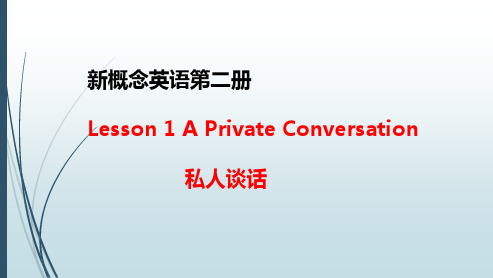
他们终于到达了一个安全的地方。
16. Peter and Tom made up __in___th__e__e_n_d____.
彼特和汤姆最后和解了。 17. The shelf, too weak to ___b__e_a_r___all the books,
There is a ban on smoking in the theatre.这剧院内禁止吸烟。 The theatre gives two performances a day.剧院一天上演两场 。 2. play [pleɪ] vt. 游戏;扮演;演奏;播放; n. 游戏;比赛;剧本 They played in the little garden.他们在小花园里玩耍。 It's my favourite Shakespeare play.这是我最喜欢的莎士比亚剧 。 3. seat [siːt] n. 座位;底座;席位 He sat down on the nearest available seat. 他在最近的空座位上坐下来。 She got on the bus and picked a seat near the window.
这剧院内禁止吸烟。 2. The ____t_h_e_a__t_re____ gives two performances a day.
剧院一天上演两场。 3. They ___p__la__y_e_d_____in the little garden.
他们在小花园里玩耍。 4. It's my favourite Shakespeare __p_l_a_y____.
新概念二第一课

③ go to +名Байду номын сангаас (名词前不加冠词)
Eg: go to school 去上学 go to hospital 去医院看病
2. enjoy +sth. 喜欢,从中得到享受;
enjoy the music/ the dinner enjoy doing sth. enjoy oneself :过的开心,愉快
Business
n. 事(私人的事或份内的事)
Eg:It’s none of your business. 不管你的事!
n. 生意 do business 做生意 on business 出差
Rudely adv. 无礼地,粗鲁地 rude adj. 粗鲁的,无礼的
Lesson 1
简单陈述句的语序?语序when主语谓语宾语howwherewhen?如果时间和地点连在一起
《新概念英语第二册》 LESSON 1 A Private Conversation
NEW WORDS AND EXPRESSIONS
1. private ['praivit] a.私人的 2 conversation [kɔnvə'seiʃən] n.谈话 3 theatre ['θiətə] n.剧场, 戏院 4 seat [si:t] n.座位 5 play [plei] n.戏 6 loudly ['laudli] ad.大声地 7 angry ['æŋgri] a.生气的 8 angrily ['æŋgrili] ad.生气地 9 attention [ə'tenʃən] n.注意 10 bear [beə] v.容忍 11 business ['biznis] n.事 12 rudely ['ru:dli] ad.无礼地 ,粗鲁地
新概念英语第二册(第一课)课文详解

She loves to gossip to her neighbors.
她喜欢议论邻居们的是非长短。 gossip to sb. 讨论某人的是非
She's a terrible gossip. 她专爱说人闲话。
课文语言点详解
Last week, I went to the theatre.
They made the secret public. 他们公开了这个秘密。
a danger to public health
对公众健康的威胁
Smoking is not allowed in public places.
禁止在公众场合吸烟。
privacy n. 隐私
Newspapers often don't respect the individual's right to privacy.
Talk with/to sb about sth
I had a long talk with the headmaster about my son. 关於我儿子的问题我与校长谈
了很长时间.
而作复数时则常指政治家之间在庄 重的场合中进行的严肃谈话:
to hold peace talks 举行和谈
go to school 去上学; go to church 去做礼拜; go to hospital 去看病 go home 回家休息
[注]跟home相连一定表示没有事情可做,休闲
I had a very good seat.
考点:作为动词的seat与sit的区别 sit--vi; seat--vt seat sb 让某人就坐
新概念英语第二册第一课(包含课文、练习及答案)
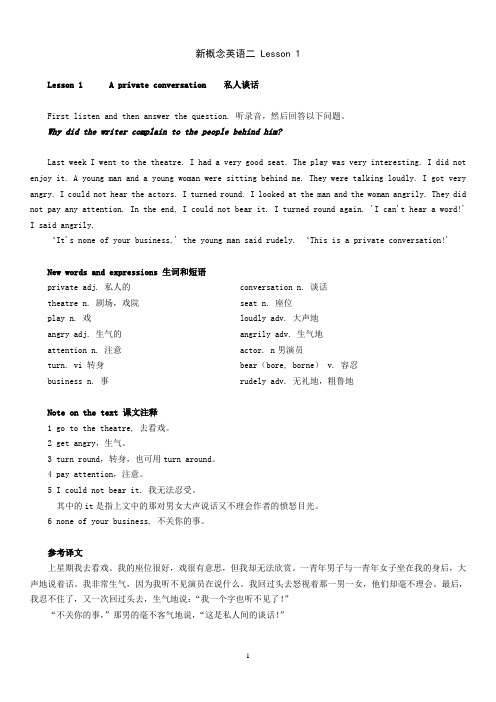
新概念英语二 Lesson 1Lesson 1 A private conversation 私人谈话First listen and then answer the question. 听录音,然后回答以下问题。
Why did the writer complain to the people behind him?Last week I went to the theatre. I had a very good seat. The play was very interesting. I did not enjoy it. A young man and a young woman were sitting behind me. They were talking loudly. I got very angry. I could not hear the actors. I turned round. I looked at the man and the woman angrily. They did not pay any attention. In the end, I could not bear it. I turned round again. 'I can't hear a word!' I said angrily.‘It's none of your business,' the young man said rudely. ‘This is a private conversation!'New words and expressions 生词和短语private adj. 私人的 conversation n. 谈话theatre n. 剧场,戏院 seat n. 座位play n. 戏 loudly adv. 大声地angry adj. 生气的 angrily adv. 生气地attention n. 注意 actor. n男演员turn. vi 转身 bear(bore, borne) v. 容忍business n. 事 rudely adv. 无礼地,粗鲁地Note on the text 课文注释1 go to the theatre, 去看戏。
新概念英语第二册 第一课 Lesson01 a private conversation
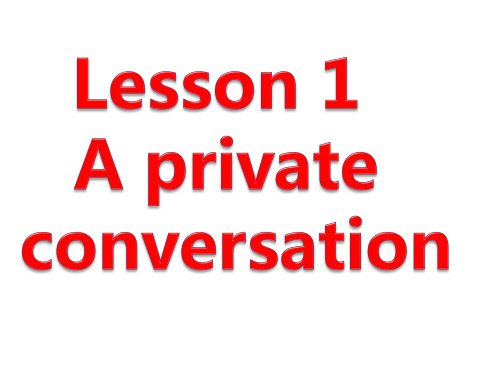
a bear hug 热烈的拥抱 bear 熊
★ business n. 事, 生意
① n. 生意 business man : 生意人 do business: 做生意 on business: 因公出差
② n. 某人自己的私人的事情 It's my business. (指私人的事, 自己处理) It‘s none of your business. 不关你的事。 Mind your own business. 管好自己的事 情。
• seat n.座位 Please take/have
a seat. 请坐下.
Is the seat taken? 这座位有人坐吗?
打篮球 弹钢琴
play n. 戏 看戏 see a play
play v. 打(球),弹奏
play basketball
play the piano
loudly adv. 大声地 现在他们正在大声讲话。
3. The play was very interesting.
interesting adj.
• ---ing 令人… 的 • ---ed 自己感到… 的 • This book is interesting. 书有趣 • be interested in… 对……感兴趣
interest n. 兴趣 have interest in… 对…感兴趣
Words of lesson 1
public theatre
private
conversation
play
angry
angrily
seat
attention
bபைடு நூலகம்siness
stand
新概念英语第二册第一课课件整合版
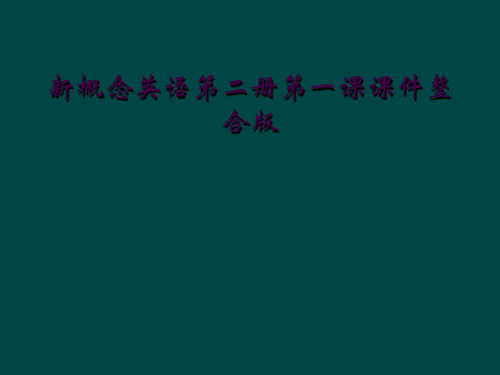
I got very angry. I could not hear the actors. 我非常生气,因为我听不见演员在说什么。
比方说:他大声地说。
主语是他。谓语动词是说。那么他怎样说呢,大声地 说。
这个大声地,是说的方式,我们称之为方式状语。 那么这个事件还需要个时间和地点了,(where&when)
称作地点状语和时间状语。
那么简单陈述句的成分一般包括:主语,谓语,宾语, 方式状语,地点状语和时间状语。
private conversation!'.
最后,我忍不住了,又一次回过头去,生气地说:“我一个字也听
不见了!”
“不关你的事,”那男的毫不客气地说,“这是私人间的谈话!”
in the end 经过一系列的变化之后,最终某事才发生(可用于 将来时)
at last 经过克服困难,最终达到某种目的
finally 按照一定的顺序进行到最后,强调次序
The book is so interesting that I do not want to put it down.
interested adj. .对…感兴趣的
be interested in sth/ doing sth
eg. 我对运动感兴趣。 I am interested in sports.
cinema n.电影院 movie/film n.电影
新概念英语第二册第一课

Last week I went to the theatre. I had a very good seat. The play was very interesting. I did not enjoy it. A young man and a young woman were sitting behind me. They were talking loudly. I got very angry. I could not hear the actors. I turned round. I looked at the man and the woman angrily. They did not pay any attention. In the end, I could not bear it. I turned round again. 'I can't hear a word!' I said angrily. 'It's none of your business,' the young man said rudely. 'This is a private conversation!'.
3. The play was very interesting. I did not enjoy it.戏很有意思,但我却无法欣赏。
interesting adj .引起兴趣的,有趣的(修饰物)
Eg : This man is very interesting. The book is so interesting that I do not want to put it down.
New
- 1、下载文档前请自行甄别文档内容的完整性,平台不提供额外的编辑、内容补充、找答案等附加服务。
- 2、"仅部分预览"的文档,不可在线预览部分如存在完整性等问题,可反馈申请退款(可完整预览的文档不适用该条件!)。
- 3、如文档侵犯您的权益,请联系客服反馈,我们会尽快为您处理(人工客服工作时间:9:00-18:30)。
3. theatre n. 剧院 Cinem theater a 4. play n. 戏剧 movie playfellow playboy playground 5. seat n. 座位 have (take) a seat 6. loudly adv. 大 声地
副词变为形容词:loud大声 的
公事公办
thing matter affair
泛指的事情 麻烦事 事务(正式)
国
international affairs
Listen to the tape
Why did the writer complain to
the people behind him?
Because they were talking loudly
2. conversation 话
n.
谈
我们还学过哪些有关说话的词呢? subject of conversation
dialogue
话题
比较正式,还可以指国家间
的对话 eg. China and USA are having a 中美正在进行对话。
dialogue.
talk 内容上可以正式也可以私人 conversation 内容上就是私人的 chat 就是闲聊,无关紧要的事
1.重点短语:go to the+地点 干嘛
Explain the text
表示去某地
去 去学 去
eg:
看病
go to the doctor’s go to the school
校
go to school
上学
相同的还有church和hospital等。 2. enjoy 的用法:
got angry 生气 这里是态度有所转变。 3. turn round=turn around 表示转身,回头
作业
不 多 哟 !
背诵课文。 背诵单词。
完成课后练习
Last week – went – theatre – didn’t enjoy –were sitting – talking loudly – could not – actors– turned– looked – angrily—pay attention– in the end – bear– can’t hear– none – business-private
can't hurt me. 坑爹理由:1.Hurt the feeling of sb 伤害某人的感 情 例子:She hurt me when she did not include me among her guests. 2.I hurt my finger.
Tiptoe around them!
New
words
1. private adj. 私人的 private life private property private space in private public 公共的,公开的 public place public house pubic letter 注:private/privacy n. 隐私/列兵 eg. It‘s my privacy. 这是我 的隐私。
2.
Answer the questions:
• • • • 1、Where did the writer go last week? 2、Did he enjoy the play or not? 3、Who was sitting behind him? 4、Were they talking loudly ,or they talking quietly ?
9. attention
n.
注意/立正
Attention,please! 请注意! pay attention to sb./sth. 注
意人/某事
不注意 pay no attention 有点注意 pay little attention 密切注意 pay close attention 更多注意
• 5、Could the writer hear the actors or not? • 6、Did he turn around or not? • 7、What did the writer say? • 8、Did the young man say ,―the play is not interesting‖ or did he say ,―this is a private conversation‖?
rudely
adv.
粗鲁
7.
adj. 生气的 be angry with sb. 生某人的气 be angry at/about sth. 为某事而生气
angry
8. anglily
adv. 生气地 angry形容词变副词:y变i+ly cross=angry也可以表示生气
mad
气得发疯 (美式用法) be blue in the face 气的脸发紫 feel hot under the collar 气 的胸口发闷
pay more attention
10. bear
了了。
v.
容忍
eg. I can't bear it. 我受不
忍受
stand
tolerate 忍耐(不提出反对意见) suffer 遭受 (伤害/病痛) put up with sb. 容忍某人/某事
bear
n.
熊
polar bear
北极熊
11. business n. 事(私事) on business 出差 Business is business。
新概念英语第二册
Practice and Progress.
实践出新知。
强者!
大胆说出我们的自信!
Believe in your dreams. 1 相信你的梦想 Believe when others 2 might not.
相信当别人不相信自己时。
First:介绍自己
Second:
流行语
Sixth :作业
1.Where did the writer go last week? 2. Why didn’t he enjoy the play? 3. What did the young man say to the writer?
1.A private conversation 2. talk loudly 3. got angry 4. turn round 5. pay attention 6. bear 7. It’s none of your business 8. rudely
本课内容
Fifth:
练习
Third:
单词学习
Fourth:
课文讲解
<流行口语酱紫说>
Top1 “伤不起” 适用人群: 剩女 an old lady 白领 white collar worker 必剩客 unemployed university graduates 英语肿么说 ???
“坑爹”版:You
伤不起“拉轰”版:
英文原版解释: 1)to act very cautiously about sth 谨慎的对待 2)to avoid speaking about a painful or controversial issue. 不要讲让人痛苦 的话题 例子:Tiptoe around the English learners! 学英语的“孩纸”伤不起。
Hale Waihona Puke What do I like doing in my spare time?
Lead-in What do you think is happening in the picture? A man turned round and looked at the man and the woman angrily.
